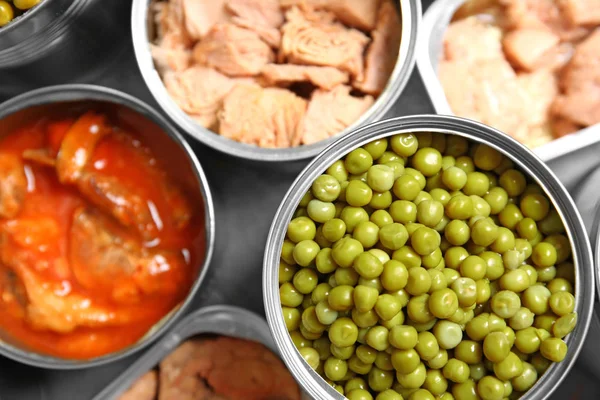Does canned foods cause cancer? Canned foods are food products that have been processed, sealed in airtight containers, and preserved using various methods such as heat, pressure, or chemicals. This preservation process helps extend the shelf life of the food and can maintain its quality and nutritional value.
Canned foods offer several benefits, including convenience, affordability, and accessibility. They are readily available in supermarkets and can be stored for an extended period without refrigeration. Canned foods also offer a wide range of options, including fruits, vegetables, meats, and seafood.
The Controversy Surrounding Canned Foods
The controversy surrounding canned foods arises from concerns about the potential health risks associated with certain aspects of the canning process. Two primary factors have received considerable attention in recent years: the presence of bisphenol A (BPA) and the potential for nutrient loss during processing.

RELATED: 7 Disadvantages of Canned Food That Can Jeopardize Your Health
The Potential Link Between Canned Foods and Cancer
- BPA and Its Role in Canned Foods Bisphenol A (BPA) is a chemical compound used in the production of some can linings. It is known to mimic estrogen and has raised concerns due to its potential adverse health effects. Studies have shown that exposure to BPA may disrupt hormonal balance and contribute to various health issues, including cancer.
- Other Potential Factors in Canned Foods Apart from BPA, other factors in canned foods might contribute to the potential link with cancer. For example, the high-temperature processing involved in canning can lead to the formation of certain compounds that may have carcinogenic properties. Additionally, nutrient loss during processing could impact the overall nutritional value of the food.
Balancing Risks and Benefits
While concerns exist about the potential link between canned foods and cancer, it is essential to consider the overall context. Canned foods offer several benefits, such as affordability, convenience, and extended shelf life. Additionally, many regulatory bodies have established guidelines and safety standards to minimize risks associated with canned foods.
It is crucial to note that the risk of cancer is multifactorial and influenced by various factors, including lifestyle choices, genetic predisposition, and overall diet. The occasional consumption of canned foods as part of a balanced diet is unlikely to cause significant harm. However, individuals concerned about potential risks can take steps to minimize their exposure.

Tips for Minimizing Risk
- Choose BPA-Free Cans: Look for cans labeled as BPA-free or seek alternative packaging options such as glass jars or pouches.
- Opt for Fresh and Frozen Alternatives: Whenever possible, choose fresh or frozen fruits, vegetables, and other foods as they typically have a lower risk of potential contaminants.
- Read Labels: Pay attention to ingredient lists and nutritional information on canned food labels. Look for products with minimal additives and preservatives.
- Moderation and Variety: Incorporate a variety of foods in your diet, including fresh produce, whole grains, lean proteins, and healthy fats. Limit your reliance on canned foods as the primary source of nutrition.
- Practice Safe Food Handling: Properly store and handle canned foods to minimize any potential risks of contamination. Follow recommended guidelines for storing and consuming canned products.
Frequently Asked Questions (FAQs)
Q1: Are all canned foods harmful? No, not all canned foods are harmful. The potential risks associated with canned foods depend on various factors, such as the presence of certain chemicals and the overall diet and lifestyle of an individual.
Q2: Is BPA present in all canned foods? BPA is not present in all canned foods. Some manufacturers now produce BPA-free cans or use alternative packaging materials. It is advisable to read labels and choose products labeled as BPA-free if concerned.
Q3: Can consuming canned foods in moderation be safe? Yes, consuming canned foods in moderation as part of a balanced diet is generally considered safe. It is essential to focus on overall dietary variety and make informed choices regarding food sources and preparation methods.
Q4: Are there alternatives to canned foods? Yes, there are alternatives to canned foods. Fresh and frozen options provide similar nutritional benefits and often have lower risks associated with certain contaminants. It is recommended to incorporate a variety of food sources in your diet.
Q5: Where can I find more information about safe food handling practices? For more information about safe food handling practices, you can refer to reputable sources such as the Food and Drug Administration (FDA) or the Centers for Disease Control and Prevention (CDC).









